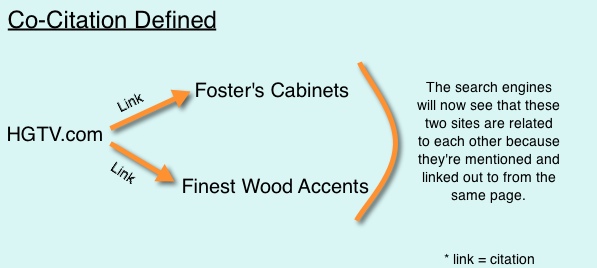WTF is a Co-Citation and a Co-Occurrence Anyway?!
 Face it - Search engine algorithms are logical. The people in charge of the changes to the formula have
goals and they adjust the algorithm to help accomplish those goals. That makes predicting the changes to the
formula ALL about trying to figure out the goals of the search engines and how they apply to rankings.
Face it - Search engine algorithms are logical. The people in charge of the changes to the formula have
goals and they adjust the algorithm to help accomplish those goals. That makes predicting the changes to the
formula ALL about trying to figure out the goals of the search engines and how they apply to rankings.
Sounds simple enough, but then why isn't it? In my 11 years of experience I've learned that it's complicated because people make it that way. For example, when a trusted authority on search figures out a new change and explains it to their readers, like all scientists, they tag the new concept with a name that leaves the average person confused.
I can sit here and name a dozen confusing industry terms without stopping for a breath (Canonical Tag, Citations, Meme, Favicon, Spam, Schema, and so on). Now, some of them may make sense to you, but I prefer things explained to a point where there is no room for error. Maybe I'm strange that way.
In this post I am going to do my best to clearly define the recently coined SEO terms: Co-Citations and Co-Occurrences.
For starters, these words are so new that no one has really even stopped to put a solid definition on them. To quote Search Engine Journal:
"As these terms are not officially confirmed yet, there is a significant amount of doubt in the proper definition and explanation about co-occurrence. Some SEO professionals have suggested that co-citation and co-occurrence basically refer to the same concept. On the other hand, however, other SEO analysts and professionals, who have a keen eye on every modern SEO development, claim that co-occurrence is a bit different than co-citation."
These terms started when Rand Fishkin did a video, describing how he was seeing sites rank for terms they weren't optimized for. He called the reason for this 'co-citations' and if you skip down to the comments below his post you can see that his new term was so broad that readers quickly picked it apart. He then clarified it with:
"...when I say "co-citation" I just mean any form of association of term+brand or term+website or term+URL. All the ones you mentioned are ways that this could be accomplished (and I probably should have included them in the video)."
And that's how 'co-citation' was born.
So, after that short history, here's a black and white definition of both - with the disclaimer, that this concept is still evolving.
Co-occurrence is when the search engines decide what a page is about in context and not by grabbing the keywords that it's optimized for. It works much the same as if you didn't understand a word on its own, but when used in a sentence and you could easily apply a rough definition. Done enough times and you have little to no doubt what the word is actually about and you even begin confidently using it yourself.
That same logic allows Google to see your site/business written about in context and categorize it. So, if your business is mentioned on a page and is surrounded by industry keywords then Google can begin to understand what your site is about. Done enough times and the potential to rank your site for those keywords grows. The science is actually getting so good that it's becoming more common to see sites ranking for searches that they have not been optimized for at all. Meaning, they have NO incoming links with that anchor text, no on-site keyword optimization - nothing. They're ranking for that keyword phrase by the weight of being mentioned by enough trusted sources in context alone.
As you can see, this leaves many people worried about the future power of anchor text for ranking. On that subject, I'll simply say that as long as you're being smart about your link building then those links will continue to count.
Co-citations - The first thing to understand is that a citation is a link. So this works the same as above, but it involves associating sites because they're linked to from the same page. See the example I created below for more info:
Possible excerpt from an HGTV.com article:
"We recently worked on a whole home renovation project that left our viewers in complete awe with the finished product. The kitchen was the most impressive. The brand new all wood oak cabinets were some of the finest available within the cabinet industry, donated by <a href=LINK1>Foster's Cabinets</a>. We then accented them with an oak bar that was refinished by our own <a href=LINK2>Finest Wood Accents</a>, which is a finish cabinet shop in the area."
The above is an example of a co-citation that puts Foster's Cabinets and Finest Wood Accents in the same rough category by Google. They're both mentioned by a trusted site (HGTV.com) and they're both surrounded by text full of industry keywords. If Foster's Cabinets happens to be a large international brand with a lot of trust, then being mentioned in context with them is a very good move for the overall trust of Finest Wood Accents.

Simply put, the more your site is linked to from the same page as other trusted industry brands the better off your brand looks to Google. If you're hanging out with industry leaders, then before long their authority rubs off on you a little. Trust, Authority and Branding are already ranking factors and they'll only become more important with time.
SEO can seem really complicated. I get that. However, I've discovered one of the MAIN reasons I'm left feeling dazed and confused is because one expert defines something new - slaps a name to it and then before you know it dozens of 'experts' are tossing it around in conversation and within posts with no real definition attached. It leaves those that understand it feeling in the 'know' and those that don't, too embarrassed to raise their hands and say - hey what is a 'meme' anyway?!
That is just the nature of our business. When that happens to you, shoot me a note and my team and I will be more than happy to shine some light on the topic.
 Brought to you by the experts at SearchEngineNews.com.
Who have had their finger on the pulse of the SEO industry for 16 years. Reading every mainstream
blog, talking with industry insiders and separating what works from what doesn't - ALL so you don't have to.
Learn more and signup for a 7 day trial for just $1!
Brought to you by the experts at SearchEngineNews.com.
Who have had their finger on the pulse of the SEO industry for 16 years. Reading every mainstream
blog, talking with industry insiders and separating what works from what doesn't - ALL so you don't have to.
Learn more and signup for a 7 day trial for just $1!